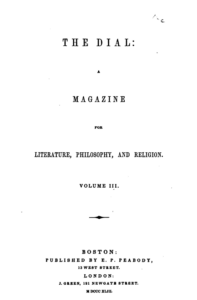
The Dial was a magazine that was published periodically from 1840-1844 and was later revived in the 1880s to 1929. It is known for its Transcendentalist ideas and writers.
Transcendentalism, defined by Merriam Webster Dictionary: “19th-century movement of writers and philosophers in New England who were loosely bound together by adherence to an idealistic system of thought based on a belief in the essential unity of all creation, the innate goodness of humanity, and the supremacy of insight over logic and experience for the revelation of the deepest truths.”
Many articles written in The Dial were published without their author, including the Dark Ages. This was important for articles that were “social critiques” and remained anonymous, but many of these articles are opinion-based. Articles were not always written with evidence and sources and were only reliable if the reader deemed it so. Therefore, many authors of The Dial wrote opinionated articles either disguised or not as informational pieces. For example, the Dark Ages article (Click here to see the original print of the Dark Ages article) does not include any references to outside sources to prove the author’s point. There are historical references to other historians and events from history, but there are no foundational theories behind the author’s work. Therefore, it is important to read and experience The Dial as you would a common video from a social media platform. It could all be completely valid information, but without direct sources (or logical explanations that are without opinion or rely too heavily on our perception of the world) that the audience can perceive, it is as accurate as fictional literature, and should be seen as such.
Upon looking into the Dark Ages article, it can be seen that the author of the Dark Ages is none other than Henry David Thoreau. Thoreau (1817 – 1862) was a philosopher and writer, and a pioneer in transcendentalism. He wrote a lot about the natural world and lived in the natural world for much of his life.
The position of the Dark Ages in relation to other articles in this journal is also noteworthy (Click here to see the full print of this journal). There’s another article that’s rather short earlier in the journal called “The Black Knight”, and a lot of the articles in this journal are related to science, history, and literature. There’s one article that stands out from the rest concerning one’s beauty which is also interesting. The Black Knight is different from the Dark Ages article because it’s a little excerpt with a poem.
One question considered while researching The Dark Ages article (and how it related to the class’s novels read) was the following: How does the understanding of history compare between articles in published magazine articles and novels?